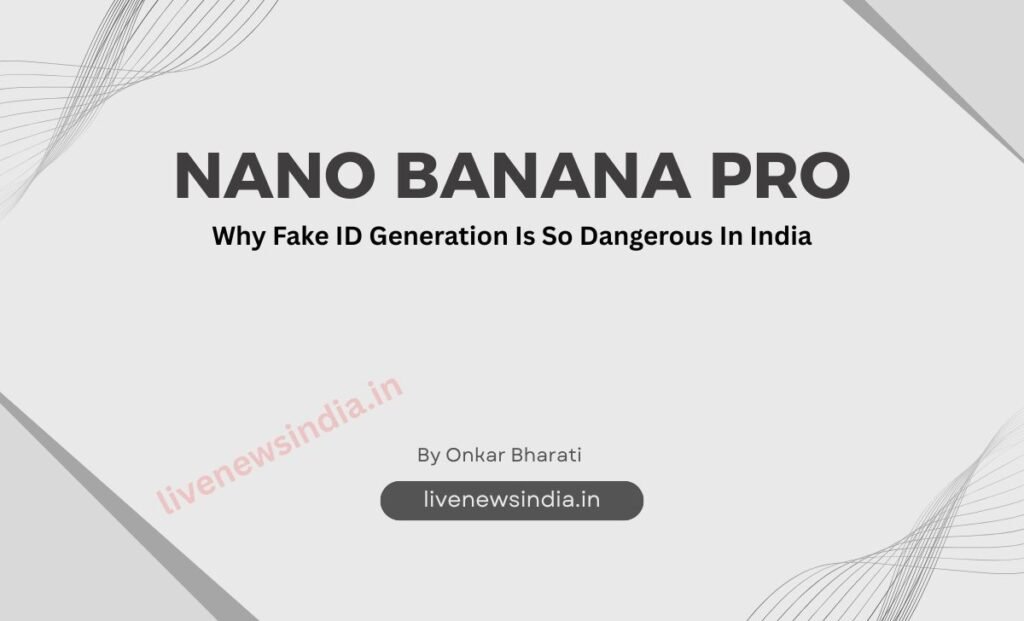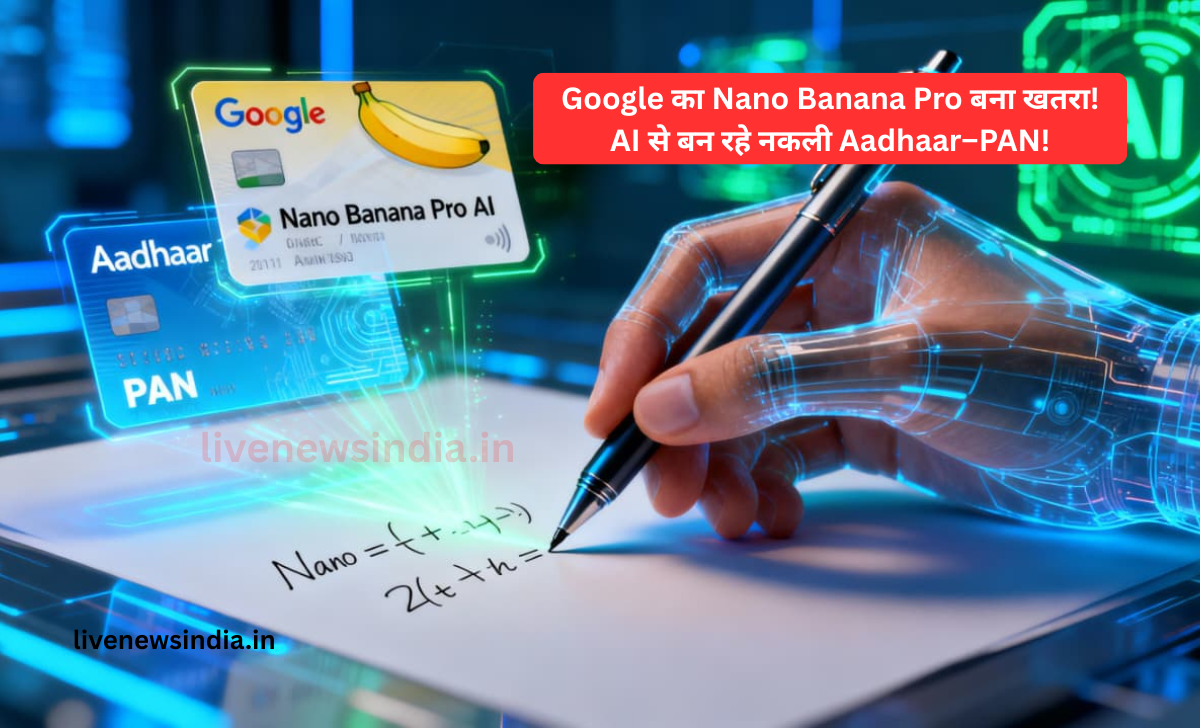Google Nano Banana Pro Sparks ID Fraud And AI Ethics Concerns In India
Google Nano Banana Pro Fake ID : Google’s new AI image tool Nano Banana Pro has become a viral sensation in India, but for all the wrong reasons. The same model that impressed users by solving handwritten maths problems is now under fire for its ability to generate shockingly realistic fake Aadhaar and PAN cards, raising serious questions about identity fraud, exam cheating, and AI ethics.
As the Nano Banana Pro trend spreads across social media, experts and tech users are warning that India’s old verification systems may not be ready for this new wave of ultra-realistic AI images. The controversy is forcing a fresh debate about how fast AI is moving and how slowly regulations and safeguards are catching up.
What Is Google Nano Banana Pro?
Nano Banana Pro is an advanced AI image generation model released as part of Google’s Gemini 3 Pro lineup. It can turn text prompts and photos into highly detailed images, including edits to real photos, stylised portraits, and realistic graphic designs.
In India, the tool became famous through the Gemini app and online trends where users asked the model to transform their own photos with different looks, filters, and outfits. Because it understands both images and text, Nano Banana Pro can read handwriting, recognise layouts, and reproduce complex visual styles very accurately.

Viral Maths Solver: AI Copying Human Handwriting
The first viral wave came when a techie shared how Nano Banana Pro solved a handwritten maths problem just from a photo of his notebook. The model read the question, solved it correctly, and then wrote the answer in handwriting that matched his own, down to the style of letters and spacing.
Screenshots of the before-and-after pages spread quickly, with many students and teachers reacting online. Some users called it “mind-blowing technology”, while others warned that this could make it easy for students to submit homework or assignments that look handwritten but are actually fully generated by AI.
Why Educators Are Worried About Exam Cheating
For years, schools and colleges treated handwritten work as proof that a student actually did the task. If AI can now produce answers in a student’s own handwriting style, this “proof of work” starts to lose its meaning. Teachers may find it harder to tell whether a page was honestly written or auto-generated in seconds.
This could have big effects on:
- Homework assignments and take-home tests
- Coaching class worksheets and practice notebooks
- Competitive exam preparation where handwritten solutions are common
Without new rules or tech tools to detect AI-generated handwriting, the education system may have to rethink how it tests real understanding and skills.
Nano Banana Pro And Fake Aadhaar, PAN Cards
The more serious alarm came when a Bengaluru-based tech professional publicly showed that Nano Banana Pro can be used to generate fake PAN and Aadhaar cards. He created ID cards for a fictional person and posted the results online to show how close they looked to genuine Indian government documents.
The fake IDs had:
- Clean, sharp text matching typical fonts on actual cards
- Realistic layout and design elements similar to official Aadhaar and PAN formats
- High-quality photos and backgrounds that could easily fool a quick visual check
He warned that traditional image-based verification systems are “doomed to fail” when faced with such precise AI-generated forgeries.

Why Fake ID Generation Is So Dangerous In India
In India, Aadhaar and PAN are not just identity proofs; they are keys to everyday life. These IDs are used for bank accounts, SIM cards, KYC checks, government subsidies, hotel check-ins, courier deliveries, and many other services.
In many real-world situations, staff only glance at the card for a second and do not scan QR codes or verify numbers with official databases. If someone prints a high-quality AI-generated Aadhaar or PAN card, it could be enough to:
- Open accounts using stolen or fake details
- Receive deliveries or services under a false name
- Misuse another person’s identity without them realising quickly
This raises the risk of financial fraud, money laundering, SIM swap scams, and other crimes.
What Experts And Tech Users Are Saying
The Bengaluru techie who shared the fake ID experiment said that Nano Banana Pro’s accuracy is both impressive and deeply worrying. He argued that image-only verification is no longer safe and that organisations must rely on digital backend checks such as QR scans and database verification to confirm identity.
Other users online compared Nano Banana Pro with earlier tools like ChatGPT’s image model, saying that while multiple AIs can generate fake IDs, Google’s tool stands out because of how clean and realistic its outputs look. This has sparked a wider conversation in India about AI misuse and the need for stronger digital security standards.
Google’s Watermarks: Gemini Logo And SynthID
Google says AI images generated through Nano Banana Pro carry watermarks to help detect them later. Many outputs include a visible Gemini logo in the corner, and the company also uses an invisible digital watermarking system called SynthID that can be detected with its own tools.
However, users and experts have pointed out major weaknesses:
- Visible logos can be cropped, covered, or edited out before printing or sharing.
- SynthID requires someone to actively check the image through the right tool, which rarely happens when a guard, receptionist, or courier staff quickly checks an ID.
Even Google has acknowledged that current measures are not enough and that it is still working on better public tools to detect AI-generated images.
Google’s Response And Privacy Questions
So far, Google has not issued a detailed public statement specifically about Nano Banana Pro being used to create fake Aadhaar or PAN cards. The company has spoken more generally about AI image privacy and misuse, saying that it tries to fulfil user queries while also adding safety layers, but it does not always know the user’s real intention behind a prompt.
Privacy experts are also worried that people are uploading their own faces, documents, and personal details into AI apps without fully understanding how this data might be stored or processed. This concern is especially strong in viral trends where users rush to try new effects and filters, including Nano Banana-based photo edits, without reading any terms or settings.
Impact On Security, Banking And KYC
If AI-generated IDs become common, banks, fintech startups, telecom operators, and online platforms will have to upgrade their verification systems. Simple document upload checks or manual eye-based approvals will no longer be enough to detect fraud.
Experts suggest that organisations should:
- Verify Aadhaar using official QR code scans and backend APIs instead of just a photo.
- Combine document checks with live face verification or video KYC.
- Use fraud-detection tools that can flag suspicious patterns, such as repeated use of the same photo or layout changes.
Without such upgrades, criminals could use AI tools like Nano Banana Pro to slip through weak onboarding processes.
AI Ethics: Innovation Versus Misuse
The Nano Banana Pro case shows the classic AI dilemma: a powerful technology that can be used for creativity and productivity is also very easy to misuse. On the positive side, the tool can help designers, students, content creators, and businesses generate high-quality images quickly.
On the negative side, the same capabilities can break social trust when used to forge IDs, fake signatures, imitate handwriting, or create misleading photos of people without their consent. This raises ethical questions about how much responsibility lies with tech companies, regulators, and end users.
What Needs To Happen Next In India
The growing backlash around Nano Banana Pro is a signal that India needs stronger AI governance and digital security practices. Policymakers, regulators, and industry groups will likely have to issue clear guidelines on:
- How AI tools should handle sensitive formats like ID cards.
- What kind of prompts should be blocked by default.
- How companies must inform users about watermarking and data usage.
At the same time, citizens need more awareness about not sharing their personal data with untrusted apps and about checking official channels whenever identity or money is involved. Law enforcement officers and cybersecurity experts in India have already begun warning people about scams linked to AI-generated images and fake trends.
Practical Safety Tips For Everyday Users
For regular people who just see Nano Banana Pro as a fun AI tool, a few simple habits can reduce risk:
- Never share photos of your Aadhaar, PAN, or other IDs on social media or with unknown apps.
- Be careful before uploading your selfie to any random site claiming to “give you a Nano Banana effect”.
- When someone shows you an ID on a phone or a printed card in a sensitive situation, ask for QR or OTP-based verification if possible.
Small steps like these can protect you from identity theft, SIM fraud, or fake-account scams that might exploit AI-generated images.
Conclusion: A Wake-Up Call For AI Safety
Google Nano Banana Pro has quickly shifted from a fun viral trend to a serious case study in AI risk. Its ability to read handwriting, mimic writing style, and generate near-perfect ID cards shows how advanced image generation has become in just a short time.
For India, where digital identity is central to everyday life, this controversy is an early warning. Without updated verification systems, strong regulations, and better public awareness, tools like Nano Banana Pro could become powerful weapons in the hands of fraudsters instead of just creative gadgets for ordinary users.
Article End Here
If you found this article helpful, please share it to spread awareness and help others stay informed.
